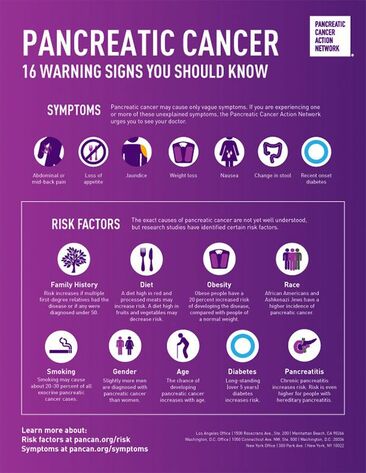Signs and symptoms of pancreatic cancer often don't occur until the disease is advanced. They may include:
If your doctor suspects pancreatic cancer, they may have you undergo one or more of the following tests:
https://www.mayoclinic.org/diseases-conditions/pancreatic-cancer/diagnosis-treatment/drc-20355427
- Pain in the upper abdomen that radiates to your back
- Loss of appetite or unintended weight loss
- Depression
- New-onset diabetes
- Blood clots
- Fatigue
- Yellowing of your skin and the whites of your eyes (jaundice)
If your doctor suspects pancreatic cancer, they may have you undergo one or more of the following tests:
- Imaging tests: Such as: ultrasound, computerized tomography (CT) scans, magnetic resonance imaging (MRI) and, sometimes, positron emission tomography (PET) scans.
- Using a scope to create ultrasound pictures of your pancreas. An endoscopic ultrasound (EUS) uses an ultrasound device to make images of your pancreas from inside your abdomen. The device is passed through a thin, flexible tube (endoscope) down your esophagus and into your stomach in order to obtain the images.
- Biopsy Sample. A biopsy is a procedure to remove a small sample of tissue for examination under a microscope. Your doctor may obtain a sample of tissue from the pancreas by inserting a needle through your skin and into your pancreas (fine-needle aspiration). Or he or she may remove a sample during EUS, guiding special tools into the pancreas.
- Blood test. Your doctor may test your blood for specific proteins (tumor markers) shed by pancreatic cancer cells. One tumor marker test used in pancreatic cancer is called CA19-9. But the test isn't always reliable, and it isn't clear how best to use the CA19-9 test results. Some doctors measure your levels before, during and after treatment.
https://www.mayoclinic.org/diseases-conditions/pancreatic-cancer/diagnosis-treatment/drc-20355427

